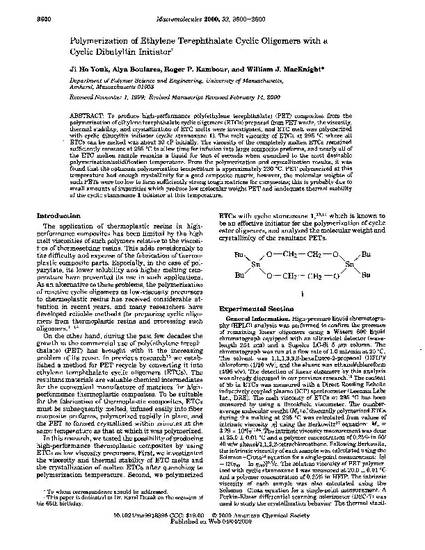
Article
Polymerization of Ethylene Terephthalate Cyclic Oligomers with a Cyclic Dibutyltin Initiator
Macromolecules
(2000)
Abstract
To produce high-performance poly(ethylene terephthalate) (PET) composites from the polymerization of ethylene terephthalate cyclic oligomers (ETCs) prepared from PET waste, the viscosity, thermal stability, and crystallization of ETC melts were investigated, and ETC melt was polymerized with cyclic dibutyltin initiator (cyclic stannoxane 1). The melt viscosity of ETCs at 295 •c where all ETCs can be melted was about 30 cP initially. The viscosity of the completely molten ETCs remained sufficiently constant at 295 •c to allow time for infusion into large composite preforms, and nearly all of the ETC molten sample remains a liquid for tens of seconds when quenched to the most desirable polymerization/solidification temperature. From the polymerization and crystallization results, it was found that the optimum polymerization temperature is approximately 230 °C. PET polymerized at this temperature had enough crystallinity for a good composite matrix; however, the molecular weights of such PETs were too low to form sufficiently strong tough matrices for composites; this is probably due to small amounts ofimpurities which produce low molecular weight PET and inadequate thermal stability of the cyclic stannoxane 1 initiator at this temperature.
Keywords
- Polymerization,
- Ethylene Terephthalate,
- Cyclic Oligomers,
- Cyclic Dibutyltin Initiator
Disciplines
Publication Date
2000
Citation Information
William MacKnight, Ji Ho Youk, Alya Boulares and Roger P. Kambour. "Polymerization of Ethylene Terephthalate Cyclic Oligomers with a Cyclic Dibutyltin Initiator" Macromolecules Iss. 33 (2000) p. 3600 - 3605 Available at: http://works.bepress.com/william_macknight/223/
